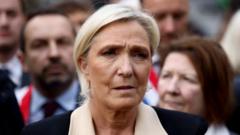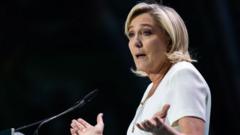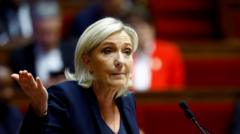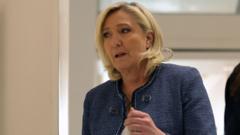Marine Le Pen’s chances for the 2027 presidential election face a critical turning point as a court decides her fate regarding party funding allegations.
**Marine Le Pen Faces Potential Political Setback in Court Ruling**

**Marine Le Pen Faces Potential Political Setback in Court Ruling**
French leader's eligibility for the presidential race hangs in the balance as trial verdict looms.
In a pivotal moment for French politics, Marine Le Pen, leader of the hard-right National Rally (RN) party, finds herself awaiting a court verdict that could determine her eligibility to contest in the next presidential election. The ruling is set for 10:00 on Monday, as Le Pen stands accused in a trial linked to the misuse of EU parliamentary funds for party salaries.
The state prosecutor has aggressively pursued a guilty verdict against Le Pen and 24 co-defendants, proposing a fine of €300,000 (£250,000) alongside prison time. Most notably, the prosecutor also suggested that Le Pen should face a five-year ban on running for public office, effective immediately—should the judges concur.
For Le Pen, the outcome is critical. “It’s my political death they are after,” she declared during the trial, highlighting the profound implications for her career. Observers across France, including those critical of Le Pen, have expressed alarm over the potential judicial overreach in influencing electoral outcomes. Veteran analysts warn about the dangers of handing judicial authority the power to disqualify candidates, stressing that such actions could undermine democratic processes.
Opinions vary on potential verdict scenarios. Le Pen might be entirely exonerated, although this option appears unlikely. Alternatively, she could receive a conviction with a non-automatic ineligibility, allowing her to appeal and maintain her candidacy. Worst-case scenarios involve automatic disqualification from running, which would necessitate her immediate appeal, complicating her political landscape significantly.
Political analysts also consider the impact of her candidacy withdrawals on the broader electoral environment. Recent polls suggest that Le Pen could secure between 34-37% of the first-round votes, positioning her ahead of other contenders. Thus, if barred from the race, the baton would likely pass to Jordan Bardella, the RN party president and potential prime ministerial candidate, who is less politically seasoned and prepared for such a significant leadership transition.
The ramifications of a ruling declaring her ineligible cannot be understated. It could embolden the minority government of Prime Minister François Bayrou, enabling opposition coalitions to effectively challenge the current administration. Ripples of Le Pen's potential disenfranchisement would fundamentally alter the dynamic within French political circles, posing questions about party loyalty and cohesion moving forward.
As the clock ticks down to the court's decision, all eyes are firmly set on the implications this ruling might hold for the future of the National Rally and its ambitions in the 2027 election.
The state prosecutor has aggressively pursued a guilty verdict against Le Pen and 24 co-defendants, proposing a fine of €300,000 (£250,000) alongside prison time. Most notably, the prosecutor also suggested that Le Pen should face a five-year ban on running for public office, effective immediately—should the judges concur.
For Le Pen, the outcome is critical. “It’s my political death they are after,” she declared during the trial, highlighting the profound implications for her career. Observers across France, including those critical of Le Pen, have expressed alarm over the potential judicial overreach in influencing electoral outcomes. Veteran analysts warn about the dangers of handing judicial authority the power to disqualify candidates, stressing that such actions could undermine democratic processes.
Opinions vary on potential verdict scenarios. Le Pen might be entirely exonerated, although this option appears unlikely. Alternatively, she could receive a conviction with a non-automatic ineligibility, allowing her to appeal and maintain her candidacy. Worst-case scenarios involve automatic disqualification from running, which would necessitate her immediate appeal, complicating her political landscape significantly.
Political analysts also consider the impact of her candidacy withdrawals on the broader electoral environment. Recent polls suggest that Le Pen could secure between 34-37% of the first-round votes, positioning her ahead of other contenders. Thus, if barred from the race, the baton would likely pass to Jordan Bardella, the RN party president and potential prime ministerial candidate, who is less politically seasoned and prepared for such a significant leadership transition.
The ramifications of a ruling declaring her ineligible cannot be understated. It could embolden the minority government of Prime Minister François Bayrou, enabling opposition coalitions to effectively challenge the current administration. Ripples of Le Pen's potential disenfranchisement would fundamentally alter the dynamic within French political circles, posing questions about party loyalty and cohesion moving forward.
As the clock ticks down to the court's decision, all eyes are firmly set on the implications this ruling might hold for the future of the National Rally and its ambitions in the 2027 election.




















